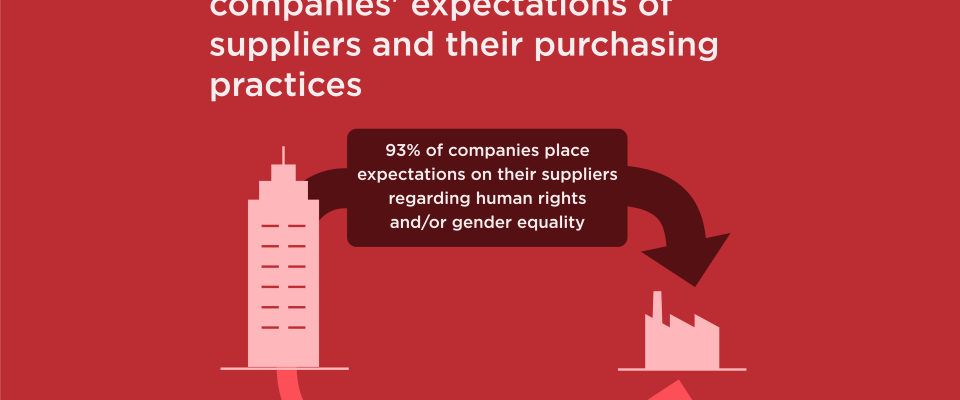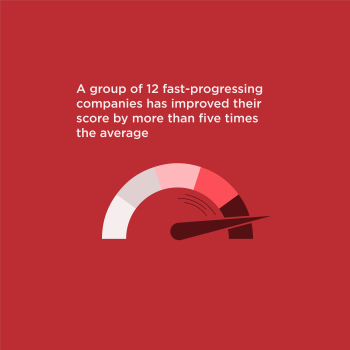Key finding
Suppliers are expected to respect human rights and promote gender equality but are set up to fail by buying companies

The majority of apparel companies have high expectations when it comes to their suppliers meeting gender and human rights standards. In fact, 85% of these companies consider their suppliers’ human rights performance when deciding to award or terminate contracts, and 87% include at least one requirement related to gender equality in their agreements with suppliers. While this shows that they recognise the risks in their supply chains, imposing requirements alone won’t solve these issues. To effectively address human rights and gender equality in the supply chain, the buying companies must create an environment where their suppliers can actually uphold their human rights and gender equality standards. While companies’ purchasing practices play a key role in this, only 27% of apparel companies provide evidence of supporting their suppliers in meeting their expectations by practicing responsible purchasing.
The way buying companies conduct their purchases plays a big role in whether their expectations can be met in the supply chain. Practices like making last-minute changes to orders, setting short lead times, making late payments, and price pressure can increase the strain on suppliers. This, in turn, can lead to excessive overtime, increased use of temporary labour, and unauthorised subcontracting and can make it harder for suppliers to provide a safe workplace and timely wages for their workers. Despite the significant impact of companies’ purchasing practices on workers in the supply chain, only 27% of companies commit to responsible practices such as making timely and accurate payments to suppliers and providing production needs in advance. The gap between high expectations and the lack of a supportive environment creates a situation where suppliers struggle to meet both human rights and gender equality standards as well as commercial demands.
In addition to creating a supportive environment through their purchasing practices, companies can also help their suppliers by offering targeted support programs. Almost half of fashion companies provide such support for gender equality (45%) or human rights issues (47%). While these programs can improve supplier capacity and performance, there’s a risk that they might be implemented haphazardly or without considering the most critical needs or risks. These programs often replace, rather than complement, the more structural responsible purchasing practices that could create an environment where suppliers can uphold human rights and gender equality standards. Among fashion companies with targeted support programs, only 20% and 26% implement responsible purchasing practices alongside them. This shows that most companies don’t have a systematic approach that combines responsible procurement with targeted support, even though the former is essential for the effectiveness of the latter.
Lately, companies have been responding to upcoming legislation like the Corporate Sustainability Due Diligence Directive in the European Union by raising their supply chain standards. However, this often puts more pressure on suppliers without giving them the support they need to meet both human rights standards and commercial demands. To truly benefit workers in the supply chain, companies need to be encouraged to support their suppliers in achieving success and discouraged from cutting ties when non-compliance is found. Striking a balance between commercial requirements and business models while implementing purchasing practices that don’t undermine human rights and gender equality efforts is crucial.
